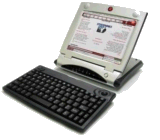Linking Ham Radio Via the Internet
|
|
CQiNet Linking Ham Radio Via the Internet |
|
Download
Documentation
EchoLinux - README
EchoLinux - Using
Links |
Possible Hardware platforms for linkingAll of the existing projects require a full blown PC. While good quality PCs can be fairly reliable in an office environment it is a scary thought to run one in a typical mountain/tower top site. An additional problem is that normal PCs consume significant amounts of both power and space. A small benefit of the dot com bust of 2001 is that there are a number of failed "Internet appliances" which have reached the surplus market. Any one of these might make a good platform for CQiNet. The three that I am familiar with are the NetPliance I-Opener, the 3Com Audrey, and the Virgin/Boundless Webplayer. Each has it's advantages and disadvantages. All three are currently available for $100 or less on the net. The current listings on ebay are a good place to start looking for one of these. All three have X86 CPUs, small color LCD screens, built in 56k modems, speakers, and microphones. Small solid state disks are used in place of a conventional hard disks. All of them are completely silent while running because they do not have fans or hard disks. The I-Appliance BBS is the granddaddy of the Internet appliance hacking sites having started the craze several years ago with the original I-Opener. Tons of information on the I-Opener, Webplayer, and Audrey is available in the various forums.
Netpliance I-Opener The I-opener has a 180 Mhz CPU, 32MB DRAM, 16MB Sandisk Flash,
1 USB port. The I-Opener
uses a wired keyboard which is an advantage because it can be easily replaced
with a standard PC keyboard and mouse for development.
The I-opener has a 180 Mhz CPU, 32MB DRAM, 16MB Sandisk Flash,
1 USB port. The I-Opener
uses a wired keyboard which is an advantage because it can be easily replaced
with a standard PC keyboard and mouse for development.Internally the I-opener has a connector for a 44 pin ATA hard disk, unfortunately with a mirrored pinout but cables are available. The I-Opener shipped with a number of different versions of the BIOS, some supported the addition of a hard disk some did not. The BIOS is flashable, or may be replaced physically if needed o gain hard disk support. Unfortunately there are many, many reports of reliability problems from people using USB Ethernet adapters, although progress is being made. The I-Opener has two serial ports internally, but they are not brought outside of the box, nor do they have RS-232 buffers. Since the I-Opener has a standard PC bios it is easy to put any operating system you desire on it.
Virgin/Boundless Webplayer
The Virgin WebPlayer has a 200MHZ National Geode CPU, 64MB DRAM, 10" Color DSTN Flat Panel Display, 48MB M-Systems DiskOnChip, and 2 USB Ports. The keyboard is wireless and includes a trackball. Internally the webplayer has a connector for a 44 pin ATA hard disk and the DiskOnChip is socketed. Like the I-Opener the WebPlayer has a standard PC bios it is easy to put any operating system you desire on it.
Also like the I-Opener there are reports of reliability problems with the
USB Ethernet adapters, although there seem to be some adapters that
work reliability. Unlike the I-Opener the Webplayer has an internal
minipci slot which can accept an minipci Ethernet adapter card.
3Com Audrey The 3com Audry has 7.8 inch 640x480 color touch screen LCD, 32 megs of DRAM,
16MB of flash, a 200MHZ National Geode CPU, 2 USB ports, one serial port,
and a compact flash socket. The Audry uses a (lousy) wireless IR keyboard.
The 3com Audry has 7.8 inch 640x480 color touch screen LCD, 32 megs of DRAM,
16MB of flash, a 200MHZ National Geode CPU, 2 USB ports, one serial port,
and a compact flash socket. The Audry uses a (lousy) wireless IR keyboard.The Audrey runs QNX and it is possible to gain shell access. Unfortunately the Audrey does not have a PC BIOS and no one has be able to get FreeBSD, Linux or Windows to run on one yet. USB Ethernet adapters appear to work well on the Audrey. One nice feature the Audry has that the other appliances lack is a touch screen. Picture an Audrey mounted in a repeater rack panel, the touch screen would be "way cool" (tm). Development tools for QNX are freely available from QNX and are based on the GNU GCC tool chain. |